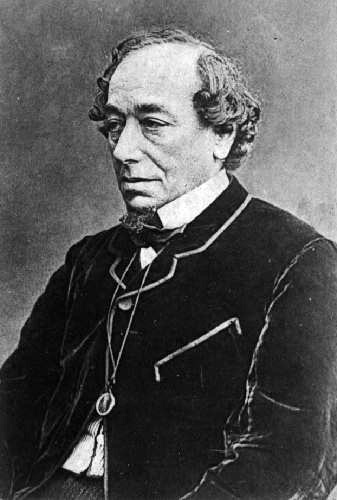Benjamin Disraeli słynne cytaty
„Człowiek nie jest tworem okoliczności, to okoliczności są tworem człowieka.”
Źródło: M. Podzielska, Nauczyciel-lider. Jak budować autorytet?, WSiP, 2009, s. 38.
Benjamin Disraeli cytaty
Źródło: Horacy Safrin, Przy szabasowych świecach. Wieczór drugi, Wydawnictwo Łódzkie, Łódź 1981, s. 173
Źródło: Geoffrey Wigoder, Słownik biograficzny Żydów, Wydawnictwo Da Capo, 1998, s. 5 (motto).
„Są trzy rodzaje kłamstw: kłamstwa, okropne kłamstwa i statystyki.”
There are three kinds of lies: Lies, Damn Lies, and Statistics. (ang.)
przypisane Disraeliemu przez Marka Twaina.
Źródło: Przykazania etyki prawniczej. Księga myśli, norm i rycin, wyb. Roman Tokarczyk, wyd. Wolters Kluwer Polska, s. 121.
Next to knowing when to seize an opportunity, the most important thing in life is to know when to forgo an advantage. (ang.)
Źródło: „Przekrój”, Wydania 14–26, Krakowskie Wydawnictwo Prasowe, 1999, s. 121.
„Rasowy mężczyzna jest drapieżnikiem, który ściga tylko wielką zwierzynę, władzę lub kobietę.”
Źródło: Małgorzata Subotić, Wino, kobiety i bilard, Presspublica, 1997, s. 269.
Benjamin Disraeli: Cytaty po angielsku
“As a general rule the most successful man in life is the man who has the best information.”
Źródło: Books, Coningsby (1844), Endymion (1880), Ch. 36.
Book V, Chapter 1.
Books, Coningsby (1844), Vivian Grey (1826)
“I am prepared for the worst, but hope for the best.”
The Wondrous Tale of Alroy, pt. 10, ch. 3.
Books
“The palace is not safe, when the cottage is not happy.”
Speech to Wynyard Horticultural Show (1848), quoted in William Flavelle Monypenny and George Earle Buckle, The Life of Benjamin Disraeli, Earl of Beaconsfield. Volume II. 1860–1881 (London: John Murray, 1929), p. 709.
1840s
“He has not a single redeeming defect.”
On William Ewart Gladstone; attributed in William S. Walsh, Handy-Book of Literary Curiosities (1892), p. 357.
Sourced but undated
The Infernal Marriage, part 3 (1834).
Books
Letter to Lady Chesterfield (22 December 1880), quoted in the Marquis of Zetland (ed.), The Letters of Disraeli to Lady Bradford and Lady Chesterfield. Vol. II, 1876 to 1881 (London: Ernest Benn Limited, 1929), p. 305.
1880s
“There can be no economy where there is no efficiency.”
Źródło: Letter to Constituents (3 October 1868), cited in Wit and Wisdom of Benjamin Disraeli, Collected from his Writings and Speeches (1881), p. 110.
“Nothing is going on, but everybody is afraid of something.”
Źródło: Books, Coningsby (1844), Endymion (1880), Ch. 2.
Źródło: Letter to Lord Grey de Wilton (3 October 1873), cited in William Flavelle Monypenny and George Earle Buckle, The Life of Benjamin Disraeli, Earl of Beaconsfield, Vol. 5 (1920), p. 262.
“They that touch pitch will be defiled.”
Actually spoken by Dogberry in William Shakespeare's Much Ado About Nothing (III.3). The KJV Bible (Ecclesiasticus 13:1) has "He that toucheth pitch shall be defiled therewith".
Misattributed
“The wisdom of the wise, and the experience of ages, may be preserved by quotation.”
Isaac D'Israeli, Curiosities of Literature, "Quotation".
Misattributed, Isaac D'Israeli
Wariant: The wisdom of the wise and the experience of the ages are perpetuated by quotations.
Book VI, Chapter 7.
Books, Coningsby (1844), Vivian Grey (1826)
Address to the electors of Buckinghamshire (25 May 1847), quoted in William Flavelle Monypenny and George Earle Buckle, The Life of Benjamin Disraeli, Earl of Beaconsfield. Volume I. 1804–1859 (London: John Murray, 1929), p. 838.
1840s
“Grief is the agony of an instant; the indulgence of Grief the blunder of a life.”
Book VI, Chapter 7.
Books, Coningsby (1844), Vivian Grey (1826)
Reported as a misattribution in Bernard Glassman, Benjamin Disraeli: The Fabricated Jew in Myth and Memory (2003), p. 185.
Misattributed
Źródło: Letter to Lady Chesterfield (19 July 1880), quoted in the Marquis of Zetland (ed.), The Letters of Disraeli to Lady Bradford and Lady Chesterfield. Vol. II, 1876 to 1881 (London: Ernest Benn Limited, 1929), p. 282.
“Mediocrity can talk; but it is for genius to observe.”
Isaac D'Israeli, The Curiosities of Literature, "Men of Genius Deficient in Conversation".
Misattributed, Isaac D'Israeli
“Nature has given us two ears but only one mouth.”
Book 6, chapter 24.
Books, Coningsby (1844), Henrietta Temple (1837)
Sidonia speaking
Book 4, Chap. 15.
Books, Coningsby (1844)
“All is race, there is no other truth.”
Lord George Bentinck: A Political Biography (1852), p. 331.
1850s
Źródło: Speech https://api.parliament.uk/historic-hansard/commons/1862/aug/01/the-administration-of-viscount in the House of Commons (1 August 1862).
Źródło: Speech on Reform Bill of 1867, Edinburgh, Scotland (29 October 1867), quoted in William Flavelle Monypenny and George Earle Buckle, The Life of Benjamin Disraeli, Earl of Beaconsfield. Volume II. 1860–1881 (London: John Murray, 1929), p. 289.
